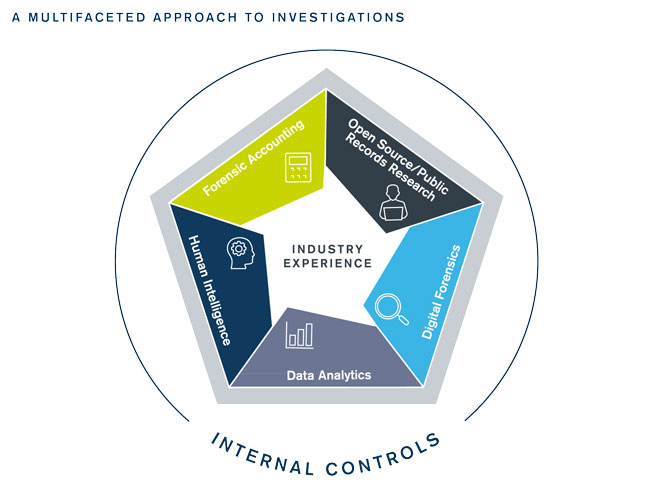Knowing what a complex investigation involves can help a company choose the right partner—and minimize risks that can arise from the investigation itself.
Organizations seeking an outside resource for strategic business intelligence and investigations have more possibilities to choose from than ever before, from large accounting firms to small detective agencies. Knowing the elements of a successful engagement enables an organization to evaluate the range of options and be an informed partner of the firm that is ultimately chosen. Such engagements, whether for corporate or government clients, require global data collection and research capabilities, in-depth knowledge of the client’s business, and a seasoned understanding of human behavior. Each of these capabilities enhances the others in a holistic approach, enabling a clear, comprehensive picture of the situation under investigation to emerge.
A multifaceted approach to investigation is particularly important given how threats can morph and combine. A contractor’s insufficient cybersecurity measures can lead to a leak of internal information, which could then feed social media attacks on the company. A counterfeiting scheme may be part of a larger money laundering operation, with funds invested in foreign real estate owned by shell companies. Because it is rarely known at the outset where an investigation will lead, a successful engagement requires investigators to extract insights using a range of capabilities, which can be grouped into five categories:
Open Source/Public Records Research
Bad actors often know exactly where the blind spots in control processes are and how to exploit them to obscure illicit activities. Sophisticated research using the growing trove of publicly available data can combine information from disparate areas— from real estate records to offshore corporate registries—to construct chains of events and generate detailed profiles of people and institutions.
Digital Forensics
A great deal of workplace behavior takes place on computer systems, smartphones, trading platforms and other devices that store information in digital form. Digital forensics leverages sophisticated tools to identify, secure and extract meaning from this ocean of digital data, often dramatically affecting the outcome of an investigation.
Data Analytics
Large-scale investigations increasingly require powerful artificial intelligence platforms that can discern patterns in massive data sets, such as millions of emails or transaction records. Effective use of these tools, however, requires ongoing investment in technology as well as specialized expertise.

Human Intelligence
Oftentimes, the best intelligence comes from other people, whether in the form of investigative interviews, field observations, or tactical methods like surveillance or undercover approaches, all of which require experience and ingenuity. In one case, Kroll was asked by a beverage manufacturer to determine if one of its distributors was surreptitiously distributing the product outside of its contractually determined sales area and thus infringing on the territory of other distributors. To solve the case, investigators purchased the product in 80 different locations throughout the country and traced the origin of the products through information on the labels.
Forensic Accounting
Accounting records play a key role in detecting or confirming fraud and theft, provided one knows where to look. Bad actors can hide illicit activity behind a facade of accepted accounting practices. An investigations firm should include a dedicated, experienced accounting team that can pierce that facade to reconstruct fund flows, transactions and timelines.
Because it is rarely known at the outset where an investigation will lead, a successful engagement requires investigators to extract insights using a range of capabilities.
While organizations engage business intelligence and investigations firms in response to an existing or potential incident, an investigation itself can also pose a threat. Investigations firms that lack global experience can inadvertently expose an organization to additional risk by making errors in judgment, failing to scrupulously follow local laws and regulations or misreading the larger context. For example, improperly gathered evidence may be inadmissible, taint the entire case, lead to a failed prosecution and thus leave the client without redress in court.
An investigations firm therefore needs to have safeguards in place to mitigate those risks. In addition to the five skills discussed above, intelligence and investigations firms need two additional, overarching capabilities:
- Industry Experience
The incidents that prompt a business intelligence and investigation assignment take place within the context of the business itself and its particular threat vectors, risk assessments and mitigation strategies. Money laundering, for example, is different for import/export businesses than for financial services firms. Further, addressing today’s threats should be done with an eye toward improving processes and controls to reduce future risks. An investigations firm must be able to work as professional peers with C-suite leaders and help the organization identify necessary remediations. - Internal Controls
Business intelligence and investigations assignments usually involve highly sensitive situations. The investigations firm must have the internal culture and controls necessary to ensure compliance with government regulations and industry best practices for issues ranging from data handling to conducting surveillance. Legal and regulatory changes must be closely monitored by the firm’s counsel, who must thoroughly vet any third parties engaged for specialized assignments within the investigation.
The process of conducting an investigation or gathering intelligence on a strategically important matter often comes at an inflection point in an organization’s history. Choosing the right partner for the task can help ensure that the engagement provides insight, closure and a solid foundation for averting future risks.
Stay Ahead with Kroll
Forensic Investigations and Monitorships
The Kroll Investigations, Diligence and Compliance team consists of experts in forensic investigations and intelligence, delivering actionable data and insights that help clients worldwide make critical decisions and mitigate risk.